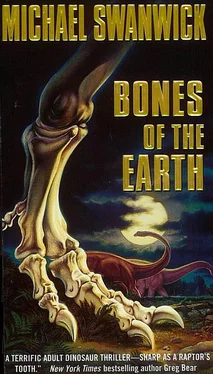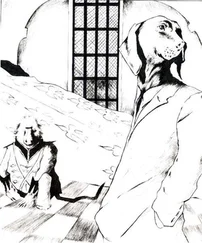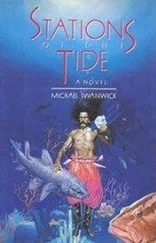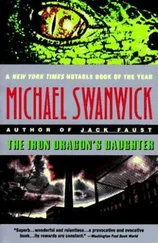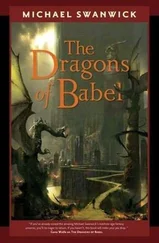“Jimmy can be a real jerk,” Molly Gerhard said. “Griffin too. I know I’m not supposed to talk about my boss like that.”
“Not unless you want to establish rapport with his girlfriend, no.”
“But we really do need to talk. Come back to the village. I’ll make you a pot of tea.”
“I was going to go upstream and…” Salley began. But suddenly she didn’t want any such thing. “Oh, all right.”
* * *
So far as Salley knew, nobody had bothered to give the village a name. It was a scattering of cottages with thatched roofs, indoor plumbing, and several appliances she couldn’t figure out. She’d seen motels that were bigger. “We have conferences here sometimes,” Griffin had explained.
“How come I’ve never heard of this?” she’d asked.
“They’re for government types—planners, bureaucrats, politicians. Not paleontologists.”
“Why is that?”
“To be perfectly frank, you’re not important enough.”
Upriver from the village loomed Terminal City, looking for all the world like a cliff of solid gold. When first she’d seen it from a distance, she’d thought it was two sea stacks miraculously stranded far inland, separated by a razor-straight line of sky and river. The color, she’d assumed, was reflection from the setting sun. Then that it was a structure built in imitation of eroded geological forms, rather like one of Ursula von Rydingsvard’s sculptures, only of yellow bricks.
But no. It really was made of gold.
“You know what?” Molly Gerhard said, breaking into her thoughts. “This would be the perfect place for a honeymoon.”
Salley snorted.
“Wrong thing to say, huh?” Molly Gerhard said quietly.
“There’s my cottage. Let’s go in. I’ll make the tea.”
* * *
Salley had just put the kettle on when she heard a familiar noise outside. She hurried to the ice box. “Here. Watch this,” she said, and went to the back door with a cabbage in each hand.
Something big was moving out in the bushes. She underhanded the cabbages lightly in that direction. Molly Gerhard came up behind her and waited.
They didn’t have to wait long before a glyptodon came lumbering out of the underbrush and onto the lawn.
Glyptodons were charming creatures, as armored as a turtle and as large as a Volkswagen. Their backs were covered with a pebbled shell that looked like a bowl turned upside down. They had matching armored yarmulkas atop their heads.
“Now that,” Molly Gerhard said, “is one ugly critter.”
“Are you nuts? It’s gorgeous.”
The glyptodon slowly approached the cabbages and examined them critically. Then it crunched first one and then the other in its beaked mouth, tossing its head as it ate. After which, it waddled away again. They were grouchy creatures, glyptodons were. They reminded her a lot of ankylosaurs.
And a little of Griffin.
The water was ready then, so she poured two cups and carried them to the kitchen table. “So,” she said. “How are the talks?”
Molly Gerhard looked discouraged. “They talk. But they won’t negotiate.”
“I’m not surprised.”
“How so?” Molly Gerhard leaned forward. “What have you figured out?”
“Nothing you wouldn’t have learned if you’d been paying attention.”
“What? What? Tell me.”
Salley sipped her tea, and said nothing.
Molly Gerhard changed tactics. “Listen to me. We’re running out of time. Our operational schedules are divided into cells, with an administrative intercept point for each one. We’re in a Priority D era, so the op-cell we have to work with is eight days long. Are you with me so far?”
“I loathe bureaucratic jargon. Give it to me in English.”
“We’ve been here six days. Two more, and the Old Man finds us and shuts us down. Come with me to Terminal City. Help us find an answer.”
“There’s nothing to be learned there.”
“And there is out here?”
“Yes,” Salley said. “Have you taken a close look at the waterbushes?”
“Those things that clog the river? No.”
“I have. They’re an entirely new plant form. I think they’re derived from kelp, believe it or not. Forget about the glyptodons. Waterbushes are much more important.”
“I’m not following you.”
“Let me put it this way. The biggest difference between the Mesozoic and the Cenozoic is not the absence of dinosaurs, but the presence of grass. Grass changed everything. It has amazing powers of recovery, which made large-scale grazing possible for the first time. Which in turn made animals like bisons and water buffalos possible. And therefore made predators like lions and tigers possible. Theoretically, birds could have evolved to fill the niches their bigger cousins vacated. How come mammals managed to make an end run around birds? Grass! It changed the rules. It made it impossible for the dinosaurs to come back.”
“Oh-kaay. I think I’m following this. So what’s the application to our present situation?”
“The waterbushes are something new. They change the rules. I want to see what they’ve made of the local ecosystem.”
“It’s a pretty dull ecosystem, I gather,” Molly Gerhard said. “Lots of drab little birds. A few lizards, and I think I saw some crawdads. I don’t see why you’d care, when you’ve got all these terrific mammals to look at. You’ve never seen them before, right? I’d think you’d be excited.”
“I was, at first. But there’s no context. It’s like going to the fucking zoo. You see an elephant, some kangaroos, and a pond full of penguins and try to figure out what kind of ecosystem produced them. You know nothing about their behavior. You know nothing about what they’re like in the wild. I want to see the Telezoic. I want to muck about in a functioning wilderness.”
She did not tell Molly, but it was immediately obvious to her that this could not possibly be the Unchanging’s home time. The environment was simply not damaged enough to be home to a technologically advanced civilization. Even if they’d reached a stage where they could restore the damaged biota, resurrect extinct plants and animals, recreate the delicate webs of interdependence, there was no way they could undo the physical damage—the mountains leveled, the minerals redistributed, pit mines dug deep into the earth.
There was no way they would.
“Well,” Molly Gerhard said, “if you want to go look, why don’t you?”
Salley lifted her chin, to make her torc more prominent.
With a stricken expression, Molly reached out to touch Salley’s arm. “Oh, Salley. You don’t really think…”
“Yes. I do.”
* * *
The crate had been humiliating enough.
But when she’d emerged from it into Terminal City, Salley wasn’t expecting to be put on a leash. The Unchanging, however, were astonishingly literal-minded. They had fit the torc around Salley’s neck, and given Griffin the controller. He’d slipped it into his pocket. “I promise you,” he’d said, as soon as the Unchanging were out of earshot, “I will never use it.”
She stuck out her hand. “Fork it over, and I’ll make damned sure you won’t.”
Griffin looked pained. “I can’t do that. They’d know.”
“You like this!” Salley spat. “You’re enjoying it.”
“Of course I’m not.”
Arguing, they’d stepped through a transport gate and into the village.
* * *
They’d patched things up that night, and slept together, and even made love. But it still rankled. So, after a day’s unhappy thought, she’d gone walkabout.
The mammals were delightful. She had to admit that. What she had originally thought a game preserve, but eventually concluded must be a quarantine area or holding pens for transshipment, was stocked with marvels. The kyptocerases alone—primitive, deerlike ungulates with two horns over their eyes and another pair on their noses—were well worth price of admission. She broke out laughing every time she saw one. They might have been invented by Dr. Seuss.
Читать дальше
